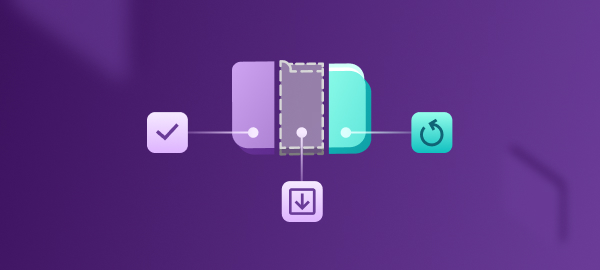Bitrise is excited to announce that key-based caching is now officially out of beta and ready to use for users on credit-based or trail plans, and those utilizing private cloud. We want to thank our users who helped shape key-based caching over the last few months.
In short, key-based caching gives you more explicit and granular control on what to cache, allows you to share a cache across workflows, branches, and stacks, and automatically invalidates your stale cache files.
What is key-based caching?
Key-based caching utilizes a key-value approach to store build artifacts and dependencies. This means it significantly improves the speed and efficiency of your builds by reducing the time it takes to download and install dependencies while developing. So, it frees up developer time for more important tasks.
Why use key-based caching?
The three main benefits of using key-based caching include having finer controls over setting up cache rules, sharing a cache across workflows, branches, and stacks, and having more control over restoring cache entries.
We covered why you should use key-based caching in this blog post.
Key-based caching early results
Over the last few months, our key-based caching feature has been tested and used by some of the biggest brands in the mobile development industry, and the feedback has been overwhelmingly positive.
You’ll be in good company when you use key-based caching
While in beta:
- 574,519 workflows on Bitrise used key-based caching steps
- 321 customers used key-based caching steps at least once
- 42 customers had over 1000 step runs with key-based caching
- Just in the last week, 21% of workflow runs on Bitrise last week used key-based caching.
Benchmarks results from the key-based caching beta
When running tests on popular open-source apps, we saw speed improvements between 27% to 51% in the time taken to restore and save dependencies. These numbers will vary based on the size and number of dependencies.
Key-based caching pricing
Key-based caching is now available with a set storage allowance included. Soon, we’ll be launching new pricing plans that will allow for more storage, depending on which plan you are on. This will allow for the caching of more build artifacts and dependencies. Check back for info on this soon.
How to use key-based caching
Using key-based caching is easy. Simply add the two Steps — Save Cache and Restore Cache — to your workflow, and you’ll be able to leverage the improved speed and efficiency in no time. The Steps required to set up key-based caching are completely free, and you can easily manage and monitor your cache from within the Bitrise platform.
Try key-based caching on Bitrise
Test drive the new Steps for key-based caching and increase your cache performance, have finer controls over setting up cache rules, share a cache across branches to remain relevant and fast, and have more control over restoring cache entries.
We’re excited to share this news with you, and we’re grateful for your support as we continue to improve our platform and make it the best it can be. Thank you for helping us shape key-based caching over the last few months. We can’t wait to see how you’ll use it to improve your builds. With over 5,000 builds on Bitrise that are already seeing results with key-based caching, we’re confident that you should too. Start using it today.
Check it out! CI/CD caching with Bitrise is a series of articles that takes you through all there is to know about caching. Caching articles in the series currently include What is a cache, and why should you care about caching? and Dependency caching — then vs now and Dependency caching with Bitrise.




